Today Current Affairs: 25th March 2021 for UPSC IAS exams, State PSC exams, SSC CGL, State SSC, RRB, Railways, Banking Exam & IBPS, etc
Table of Contents
The Juvenile Justice Amendment Bill, 2021:
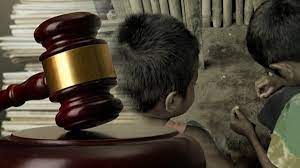
The Lok Sabha passed the Juvenile Justice (Care and Protection of Children) Amendment Bill, 2021 that seeks to strengthen and streamline the provisions for the protection and adoption of children.
- The Bill amends the Juvenile Justice (Care and Protection of Children) Act, 2015 and contains provisions related to children in conflict with law and children in need of care and protection.
- The National Commission for Protection of Child Rights (NCPCR) audit of Child Care Institutions (CCIs) in 2020, 90% of which are run by NGOs, found that 39% CCIs were not registered, even after the 2015 amendment was brought in.
- It also found that less than 20% CCIs, especially for girls, had not been set up in some states, 26% child welfare officers were not there.
- Moreover, three-fifths have no toilets, one-tenth have no drinking water and 15% homes don’t have provisions of separate beds, no diet plans.
- Rehabilitation of children is not a priority for childcare homes and children are reportedly kept in such institutions to get funds.
Key Amendments Proposed by the Bill:
- Serious offences:
- Serious offences will also include offences for which maximum punishment is imprisonment of more than seven years, and minimum punishment is not prescribed or is of less than seven years.
- Serious offences are those for which the punishment under the Indian Penal Code or any other law, for the time being, is imprisonment between three and seven years.
- Juvenile Justice Board inquires about a child who is accused of a serious offence.
- Non-cognizable Offences:
- The present Act provides that an offence which is punishable with imprisonment between three to seven years to be cognizable (where arrest is allowed without warrant) and non-bailable.
- The Bill amends this to provide that such offences will be non-cognizable.
- Adoption:
- Presently, the adoption order issued by the court establishes that the child belongs to the adoptive parents.
- The Bill provides that instead of the court, the District Magistrate (including Additional District Magistrate) will issue such adoption orders.
- Appeals:
- The Bill provides that any person aggrieved by an adoption order passed by the District Magistrate may file an appeal before the Divisional Commissioner, within 30 days from the date of passage of such order.
- Such appeals should be disposed within four weeks from the date of filing of the appeal.
- Additional Functions of the District Magistrate:
- These include: (i) supervising the District Child Protection Unit, and (ii) conducting a quarterly review of the functioning of the Child Welfare Committee.
- Designated Court:
- The Bill proposes that all offences under the earlier Act be tried in children’s court.
- Child Welfare Committees (CWCs): It provides that a person will not eligible to be a member of the CWC if he/she
- has any record of violation of human rights or child rights,
- has been convicted of an offence involving moral turpitude,
- has been removed or dismissed from service of the central government, or any state government, or a government undertaking,
- is part of the management of a child care institution in a district.
- Removal of Members:
- The appointment of any member of the committee shall be terminated by the state government after an inquiry if they fail to attend the proceedings of the CWCs consecutively for three months without any valid reason or if they fail to attend less than three-fourths of the sittings in a year.
The Supreme Court : About Women In armed Force:
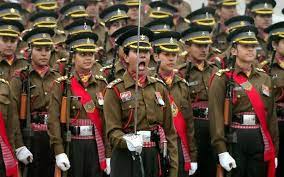
The Supreme Court held that the Army’s “selective” evaluation process discriminates against and disproportionately affects women short service commission officers seeking a permanent commission.
- The evaluation pattern of women officers has caused them economic and psychological harm, the court said.
- The court ordered that the cases of women officers who have applied for the permanent commission should be reconsidered in a month and the decision on them should be given in two months.
- They would be considered for permanent commission subject to disciplinary and vigilance clearance. The court said physical standards should be kept at a premium during selection.
Supreme court judgement of February 2020:
- The Supreme Court declared that Short Service Commission (SSC) women officers are eligible for permanent commission and command posts in the Army irrespective of their years of service.
- The Supreme Court dismissed the Union government’s submissions that women are physiologically weaker than men as a “sex stereotype.”
- The court struck down a part of the government’s 2019 circular that had proposed Permanent Commission to women officers if they had not completed 14 years in service. It commented that there was a “fundamental fallacy” in the centre’s policy of considering only women with less than 14 years for Permanent Commission.
- The verdict came on a nearly 10-year-old appeal filed by the government against a 2010 decision of the Delhi High Court to grant SSC women officer’s permanent commission.
Chhatrasal Convention Centre at Khajuraho:
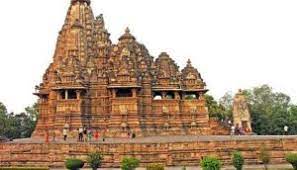
Union Minister for Tourism and Culture and Chief Minister of Madhya Pradesh will inaugurate the ‘Chhatrasal Convention Centre at Khajuraho developed under the Swadesh Darshan Scheme of the Ministry of Tourism.
- The Ministry of Tourism has framed ‘Development of Iconic Tourist Destinations Scheme’ a Central Sector Scheme for the development of nineteen identified iconic destinations in the country following a holistic approach.
- They will also launch “MICE Roadshow – Meet in India” Brand and Roadmap for the Promotion of India as MICE Destination (Meetings, Incentives, Conferences and Exhibitions) in Khajuraho, Madhya Pradesh.
Sharad A. Bobde Recommendation:
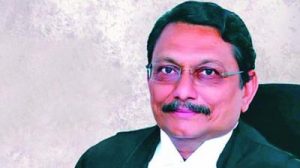
Chief Justice of India Sharad A. Bobde has recommended Justice N.V. Ramana, the senior-most judge of the Supreme Court, as the next top judge.
- Justice Ramana is now set to take over as the 48th Chief Justice of India from April 24.
Appointment of CJI:
- The Chief Justice of India is traditionally appointed by the outgoing Chief Justice of India on the day of his (or her) retirement.
- By convention, the outgoing Chief Justice of India selects the most senior then-sitting Supreme Court judge.
- Seniority at the apex court is determined not by age, but by:
- The date a judge was appointed to the Supreme Court.
- If two judges are elevated to the Supreme Court on the same day:
- The one who was sworn in first as a judge would trump another.
- If both were sworn in as judges on the same day, the one with more years of high court service would ‘win’ in the seniority stakes.
The Consumer Protection (E-Commerce) Rules, 2020:

A parliamentary panel has submitted its report on ‘The Consumer Protection (E-Commerce) Rules, 2020’.
Key recommendations:
- The government should offer a more clear-cut definition of what constitutes ‘unfair’ trade practice.
- The government should spell out a practical legal remedy to tackle the issue.
- Fix a cap on delivery charges levied by e-commerce firms.
- Provide for penal provisions for violation of rules related to misinformation.
- The Ministry of Consumer Affairs, Food and Public Distribution should issue broad guidelines for the fixation of delivery charges charged by the marketplace entities along with a cap on the highest limits of the delivery charges in peak hours of service.
- The Ministry should also clearly define ‘drip pricing’— wherein the final cost of the product goes up due to additional charges, and provide for protecting consumers against this by including penal provisions for violation.
While e-commerce enterprises offer many benefits, the development of the segment has rendered consumers vulnerable to new forms of unfair trade practices, violation of privacy, and issues of unattended grievances.
- Predatory pricing is one such issue and it may result in the competition being wiped out and prove detrimental to consumers in the long run.
- Predatory pricing is a short-term strategy, adopted by some of the market giants with deep pockets to sustain short-term losses and reduce the prices of their products below the average variable costs.
- This may lead to wiping out competition from the market and could be detrimental to the consumers in the long run.
Recent rules:
- The Consumer Protection (E-Commerce) Rules, 2020, notified on July 23, regulate all commercial transactions sold over a digital or electronic network.
- The e-com rules currently recognize two e-commerce business models, namely, marketplace model and the inventory-based model.
- The rules have separate specified provisions for the marketplace- and inventory-based entities.
- The e-com rules require that all information on the return, refund, exchange, warranty and guarantee, delivery, and shipment of the goods or services being sold, including their country of origin, be provided on the platform.
- Such details enable consumers to make an informed decision.
The National Commission for Allied and Healthcare Professions Bill, 2020:

The National Commission for Allied and Healthcare Professions Bill, 2020 was passed unanimously by the Lok Sabha.
- The Bill seeks to regulate and standardize the education and practice of allied and healthcare professionals.
- The group of allied professionals is large and the Bill is trying to regulate this field by providing dignity to their roles.
National Commission for Allied and Healthcare Professions:
- The Bill sets up the National Commission for Allied and Healthcare Professions.
- It will consist of a Chairperson, Vice-Chairperson, five members representing various Departments/Ministries of the central government, one representative from the Directorate General of Health Services, three Deputy Directors or Medical Superintendents appointed on a rotational basis from amongst medical institutions and 12 part-time members representing State Councils, among others.
- The Commission will perform the following functions with regard to Allied and Healthcare Professionals:
- Creating and maintaining an online Central Register of all registered professionals.
- Providing basic standards of education, courses, curriculum, staff qualifications, examination, training, maximum fee payable for various categories.
Professional Councils:
- The Commission will constitute a Professional Council for every recognised category of allied and healthcare professions.
- The Professional Council will consist of a president and four to 24 members, representing each profession in the recognised category.
- The Commission may delegate any of its functions to this Council.
State Councils:
- Within six months from the passage of the Bill, state governments will constitute State Allied and Healthcare Councils.
- It will complement the functioning of the National Commission and maintain a State Register.
Permission for Establishment of Institutions:
- Prior permission of the State Council will be required to: Establish a new institution.
- Open new courses, increase the admission capacity, or admit a new batch of students to existing institutions.
- If such permission is not sought, then any qualification granted to a student from such an institution will not be recognised under the Bill.
Offences and Penalties:
- No person is allowed to practice as a qualified allied and healthcare practitioner other than those enrolled in a State Register or the National Register.
- Any person who contravenes this provision will be punished with a fine of Rs. 50,000.
Double Mutant Coronavirus Variant:
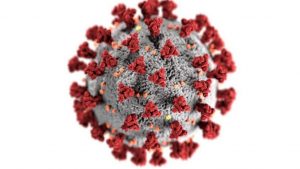
Genome sequencing of a section of virus samples by a consortium of 10 laboratories across the country, called the Indian SARS-CoV-2 Consortium on Genomics (INSACOG), has revealed a unique “double mutant” coronavirus variant — with a combination of mutations not seen anywhere else in the world.
- The new variant has been found in at least 200 virus samples from Maharashtra, as well as a handful from Delhi, Punjab, and Gujarat.
- Mutations in the virus per se are not surprising but specific mutations that help the virus evolve to thwart vaccines or the immune system or are linked to a spike in cases or in disease severity are causes of concern.
Webinar On ‘Bringing Synergies In Anti-Corruption Strategies’:
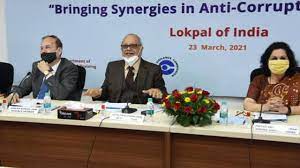
The Lokpal of India organized a Webinar on ‘Bringing Synergies in Anti-Corruption Strategies’.
- Corruption can be defined as the abuse of entrusted power for private gain.
- It can impact a nation’s development in various ways.
Impact of Corruption:
- Political Costs: The political costs of corruption are manifested in weakened public trust in political institutions, reduced political participation, perversion of the electoral process, restricted political choices available to citizens, and loss of legitimacy of the democratic system.
- Economic Costs: Corruption reduces economic efficiency by misallocation of resources in favor of rent-seeking activities, increasing the cost of public transactions, acting as an additional tax on business thereby reducing investment, reducing genuine business competition.
- Social Costs: Corruption distorts the value systems and wrongly attaches elevated status to occupations that have rent-seeking opportunities. This results in a disillusioned public, a weak civil society, which attracts unscrupulous leaders to political life.
- Environmental Costs: Environmentally devastating projects are given preference in funding because they are easy targets for siphoning off public money into private pockets.
- Issues of national security: Corruption within security agencies can lead to a threat to national security, including through distortion of procurement, recruitment of ineligible persons, providing an easy route for smuggling of weapons and terrorist elements into the country, and money laundering.
Central Scrutiny Centre (CSC) And Investor Education And Protection Fund Authority’s (IEPFA) Mobile App:
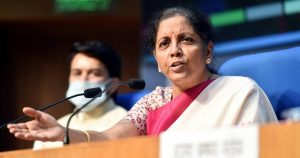
Union Minister for Corporate Affairs launched Central Scrutiny Centre (CSC) and Investor Education and Protection Fund Authority’s (IEPFA) Mobile App — two tech-enabled initiatives by Ministry of Corporate Affairs (MCA).
Central Scrutiny Centre (CSC):
- MCA is one of the key primary sources of corporate data, is required to ensure that the data quality is uncompromised and free from flaws.
- The Central Scrutiny Centre will scrutinize certain Straight Through Process (STP) Forms filed by the corporates on the MCA21 registry and flag the companies for more in-depth scrutiny.
Investor Education and Protection Fund Authority’s (IEPFA) Mobile App
- The IEPFA Mobile App aims at achieving the goal of financial literacy, spreading investors’ awareness, education, and protection among investors.
- The IEPFA App will have the facility of tracking the status and progress of the IEPF claim refund process.
- Moreover, it also provides a mechanism for investors and common citizens to report on the suspected fraudulent schemes.
India launched Its 2nd Tranche Of Auction For Commercial Coal Mining:

India launched its 2nd Tranche of the auction for commercial coal mining offering 67 mines for the sale of coal. Union Coal Minister launched the auction process.
- This is the highest number of mines on offer in a particular tranche of the auction after the commencement of the auction regime since 2014.
- Out of the total 67 mines offered by the Ministry of Coal, 23 mines are under CM(SP) Act and 44 under MMDR Act.
- The coal mines on offer are spread across 6 States Chhattisgarh, Jharkhand, Odisha, Madhya Pradesh, Maharashtra and Andhra Pradesh.
- Government of India is moving towards adopting a ‘Rolling Auction’ mechanism for conducting future auctions.
- Coal is the first mineral resource where a Rolling Auction mechanism is being implemented in which a pool of coal blocks will always remain available for auctions.
UNITAR:
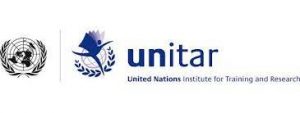
Prime Minister Narendra Modi has expressed gratitude to UN Institute for Training & Research (UNITAR). UNITAR has commended India’s remarkable progress in reducing premature mortality from Non-Communicable Diseases.
- The United Nations Institute for Training and Research (UNITAR) is a dedicated training arm of the United Nations system.
- UNITAR provides training and capacity development activities to assist mainly developing countries with special attention to Least Developed Countries (LDCs), Small Island Developing States (SIDS), and other groups and communities who are most vulnerable.
- UNITAR was founded in 1963, following the recommendation of the UN Economic and Social Council to the General Assembly.
- UNITAR Operated as an autonomous body within the United Nations system, UNITAR is headed by an Executive Director.
- The present executive director is Nikhil Seth from India who was appointed in 2015.
- UNITAR is a project-based organization and does not receive any funds from the regular United Nations budget. The institute is financed entirely from voluntary contributions.
- Headquarters are based in Geneva (Switzerland).
Shigmotsav (Shigmo festivities): GOA:
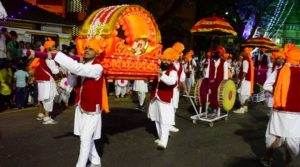
The Goa government has limited the Shigmotsav (Shigmo festivities) parades to three locations only (Panaji, Ponda and Mapusa), owing to rising cases of Covid-19 in the state.
- Shigmo is the celebration of a ‘rich, golden harvest of paddy’ by the tribal communities of Goa.
- Agricultural communities including the Kunbis, Gawdas and Velips celebrate the festival that also marks the onset of spring.
- Shigmo celebrations last over a fortnight in the months of Phalgun-Chaitra months of the Hindu calendar that correspond with March-April every year.
- The festival begins with ‘Naman’ that is the invocation of the local folk deities on the village ‘maand’ or the village stage to the beats of percussion instruments like the Ghumat, Dhol, Mhadle, and Tashe by the male folk.
- It is called the ‘romta mell’ that moves from one village to another.
- Folk dances like Ghode Modni (a dance of equestrian warriors), Gopha and Phugadi.
Shigmo Street Parade:
- Shigmo street parade floats as the highlight. It is held as an annual affair in the state capital, Panjim and other major cities like Margao, Mapusa, Vasco, and Ponda.
- These color-parties usually see people dressed in vibrant clothing performing traditional folk dances to depict the historical legacy of the Maratha War that backs this festival.
- The float parades have, over the years, been a draw for tourists both domestic and international.




